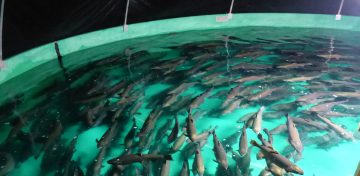We have had lots of aquaculture news recently including reports of new innovations in technology and feeds, Canadians interest in eating salmon, and updates on First Nations involvement in aquaculture in BC.

You can read about these stories and more below in News and Views and also read updates on the Graduate Certificate in Aquaculture.
If you have any questions about UBC’s certificate program, please visit the website or send an email to lfs.aquaculture@ubc.ca.
Yours aquaculturally,
Justin Henry
Aquaculture Business Director
UBC Graduate Certificate in Aquaculture
Certificate Updates
The program is now accepting applications for the fall 2022 term. Note that the program is planned to be a hybrid model this year, with students able to attend in person or remotely.
Please watch for upcoming notices about tuition financial support for residents of BC.
The certificate covers numerous topics around aquaculture production and seafood processing. The Global Seafood Alliance has posted an article and video to give a better understanding of what happens at a seafood farm and a seafood processing plant.
You can read more about the certificate program on our website.
News and Views
Researchers at Dalhousie University carried out a survey on salmon consumption and preferences in Canada. The survey revealed that 79% of Canadian consumers eat salmon, would rather eat salmon at home (44%) than in a restaurant (8%), and prefer Atlantic salmon (38%) slightly more than Pacific salmon (33%). When choosing farmed salmon, consumers also prefer ocean-based farmed salmon (39%) versus land-based (21%). This article summarizes the Dalhousie survey report.
As Canadians are interested in the health benefits of eating seafood, so are the athletes interviewed on the subject as reported in this article.
Future Trends
The aquaculture sector continues to implement more efficient technologies and culture methods which will be covered in the Graduate Certificate in Aquaculture program. Though geothermal energy has been used for many decades, land based aquaculture producers in China, Iceland, and the US have recently started to tap into that energy source for aquaculture. On the marine side, a report was commissioned by Ocean Energy Systems suggests that an emerging offshore aquaculture industry can be powered by ocean renewable energy (ORE).
Land based aquaculture farmers in China are growing rice alongside aquatic animals in an aquaponics system which can reduce the need for chemical fertilizers, pesticides.
On the feed side of innovation, new aquaculture feed ingredient producers are getting ready to scale up production of microalgae, single cell proteins, and other ingredients as reported in this article.
Fish (and orca) Health
NOAA released a biological opinion paper stating that aquaculture does not likely have an adverse impact on wild salmon or orcas in Puget Sound. SalmonBusiness discussed the paper in this article.
In other news from the US, SeaWestNews summarized a Journal of Aquatic Animal Health article stating the “new study says findings about organisms and viruses that have no significant impact on fish health is causing unnecessary controversies over salmon farming in British Columbia”. The story expands on the implications of misinformation being published regarding Piscine reovirus (PRV) and mentions a 2021 UBC LFS study that helped to debunk the publication in question.
First Nations in Aquaculture
The Federal government must decide very soon whether they still intend to move ahead with their plan to not renew 79 expiring salmon farming licences in BC this June. A previous decision to not renew 19 licences in the Discovery Islands area of BC was recently overturned by the Federal court. Justice Elizabeth Heneghan ruled that “The Decision, in the absence of reasons, cannot be justified. In the absence of reasons, it is not transparent. In the absence of reasons, it is not intelligible.”. Many First Nations agree with Justice Heneghan and have condemned the Federal government for disregarding their own science on aquaculture. Several First Nations located on the coast of BC have formed the Coalition of First Nations for Finfish Stewardship.
This Business in Vancouver article asks whether Indigenous consent includes the right to say yes in regard to salmon farming in BC. Some will not wait for the Federal or Provincial governments. This week the Ahousaht First Nation signed a new agreement allowing Cermaq Canada to continue to farm salmon in Ahousaht territory for the next five years.